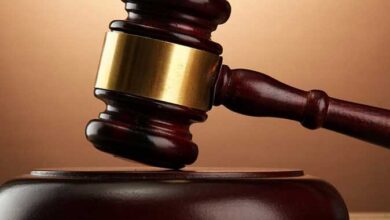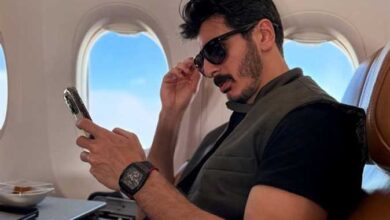The first session of the much-anticipated trial of the alleged masterminds of the notorious “Battle of the Camel,” including two of Hosni Mubarak's long-serving aides, provoked consternation on Sunday after the judge ordered a ban of live television transmission and barred the bulk of the plaintiffs’ lawyers from the courtroom after scuffles with police.
For almost one hour, state-owned television aired the trial of 25 defendants accused of recruiting thugs to “terrify” and kill peaceful demonstrators in Tahrir Square on 2 February, arming many of the attackers with melee weapons and live ammunition.
The highpoint of the broadcast consisted of shots showing Mubarak’s former protégés Safwat al-Sherif and Ahmed Fathi Sorour languishing inside the dock. Dressed in prison white, Sherif, 77, former speaker of the Shura Council and former secretary general of the disbanded National Democratic Party (NDP), and Sorour, 79, former speaker of the People's Assembly, appeared clam and well. Sherif had his hair dyed brown as usual.
The judge for the trial, Justice Mostafa Hassan Abdallah, dedicated the first part of today's session to hearing the demands of tens of lawyers representing the defendants. After a short recess, he announced the end of live television transmission of the trial.
"This proves that there is a strong inclination to impose restrictions on the media and on people's access to information," said Gamal Eid, a lawyer and executive director of the Arab Network for Human Rights Information. He added that his organization will appeal this decision soon in an administrative court.
“This is a public opinion case and the decision to impose the ban should be justified and should be for clear reasons and for a limited period of time," added Eid, whose organization represents many of revolution’s victims in several court cases nationwide.
However, Ahmed Ragheb, director of the Hisham Mubarak Law Center, interpreted the media ban as an indication that the trial might be “impartial.”
Ragheb, whose organization represents some of the victims of the attacks, said that plaintiffs’ lawyers may file a request for a change of judge, on the grounds of his alleged loyalty to the old regime. Ragheb refers to an acquittal verdict that Abdallah handed down in a case against a former prominent NDP parliamentarian.
In 2008, Justice Abdallah acquitted Hani Sorour, a former member of the People’s Assembly and CEO of a medical supplies company, who was accused of providing hospitals with contaminated blood bags. The verdict caused outrage among many observers and was seen then as a sign of corruption. Later, Sorour was convicted by another court and sentenced to three years in prison. July 2010, the Cassation Court acquitted him.
The Battle of the Camel represented a turning point in the 18-day uprising that toppled former President Hosni Mubarak, galvanizing support for the revolutionary forces and causing thousands of previously undecided observers to join the anti-regime protests.
On 1 February, Mubarak addressed the nation with an emotional speech, expressing his desire to live the rest of his life and die on Egyptian soil. He also affirmed that he would step down at the end of his term in September and promised a set of constitutional amendments to open up the political space. His speech hit a nerve with many Egyptians, who sympathized with the ailing 83-year-old dictator and felt there was no need for more protests.
But this sympathy evaporated quickly in light of developing events on the streets of Cairo.
In the early afternoon of 2 February, large groups of hired thugs flooded Tahrir Square to attack protesters with rocks, clubs, bladed weapons and chains. Among the attackers were some riding horses and camels, from which the incident took it's common name. Some of the attackers climbed on the rooftops of buildings and threw Molotov cocktails and allegedly fired bullets at demonstrators. The violence lasted more than 12 hours and left 11 dead.
Contrary to the expectations of those organizing the attacks, they provoked widespread anti-Mubarak feeling and helped force his resignation on 11 February.
Along with Mubarak's two prominent protégés, several other former parliamentarians and businessmen languished in the cage during Sunday’s session, including former Manpower Minister Aisha Abdel Hady, the former head of Egypt's Federation of Trade Unions, Hussein Mogawer, prominent businessman and former leader of the NDP, Ibrahim Kamel, and controversial lawyer Mortada Mansour.
After the prosecutors' lengthy presentation of the charges, Abdallah asked each defendant to comment. From inside the cage, Sherif, the prime suspect in the case, said: "I completely deny them." At his turn, Sorour replied: "I have nothing to do with this issue. All accusations are void and defamatory." All the remaining suspects denied the charges.
Besides the ban on live transmission, the plaintiffs’ lawyers complained about being barred from attending the session.
Earlier in the day, clashes erupted between lawyers and the police as the former tried to gain access to the courtroom. Eventually, the judge banned them from entering. However, by the time the ban was imposed, dozens of lawyers representing the defendants had already gained access to the courtroom.
"The situation was so chaotic, and the end result was that only one or two of the plaintiffs’ lawyers managed to get inside," said Ragheb.
Ragheb accused some supporters of the defendants, as well as their lawyers, of starting the fight with police in order to prompt the judge to declare a ban on lawyers entering the court.
The trial is set to resume on Monday for three days.



